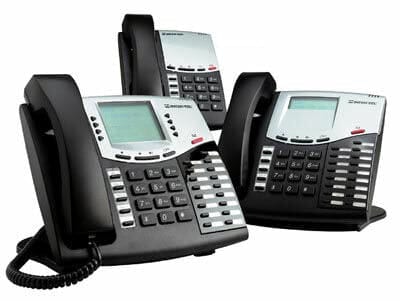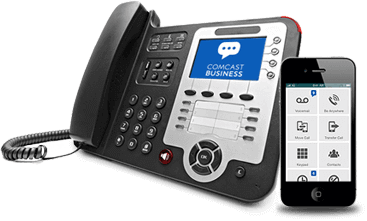Cheapest Business Phone Systems on a Budget
In today's fast-paced business environment, businesses can significantly impact communication efficiency and costs.
With many options available, businesses must know which solution fits their needs and budget. VoIP and cloud-based systems to traditional landlines and hybrid models, it's essential to understand which solution best aligns with your needs and budget.
This guide helps businesses look at the different types of business phone systems and highlights the key features they should consider when seeking cost-effective solutions.
This guide from Cheap Me Now also discusses the potential risks and long-term costs associated with cheaper options, ensuring businesses can make informed decisions for your business.

1. VoIP Systems
VoIP systems change how businesses communicate by offering adaptable and affordable phone services for companies of every size. These new systems use VoIP technology to enable voice calls over the internet, reducing traditional telecom costs and offering budget-friendly telecom solutions.
VoIP solutions perfectly meet the needs of businesses that want to improve productivity while keeping costs down, making them ideal for small business communication. With many VoIP providers available, companies can select from different VoIP phone plans and business phone plans that match their specific needs, providing a suitable option for their telecom systems.
Among the most popular types of VoIP systems are hosted and on-premises solutions. Hosted VoIP services offer the convenience of cloud-based management, freeing businesses from the hassles of extensive hardware maintenance, simplifying phone system installation.
On-premises setups, while requiring an upfront investment, may provide greater control over the system.
The benefits of adopting VoIP extend beyond mere cost savings; features such as call forwarding, voicemail services, and automated attendants improve communication efficiency.
Scalability in phone systems is another significant advantage, enabling organizations to effortlessly add lines or features as they grow. Strong customer support and combined phone software improve user experience, simplify operations, and encourage effective teamwork. For businesses considering a move to hosted solutions, it’s important to ask, is cloud telephony for your company?

2. Virtual Phone Systems
Virtual phone systems offer an easy way for businesses to improve their communication without needing physical equipment or a large telecom setup, enhancing telecommunication equipment. These systems use cloud communications to provide features like call forwarding, voicemail, and managing calls from any location, making them ideal for remote work communication.
With the rise of mobile business phones, virtual systems enable professionals to stay connected regardless of location, ensuring that customer engagement remains a top priority.
Virtual phone systems support both inbound and outbound calling services, allowing teams to effectively handle customer inquiries while actively reaching out to potential clients.
Using these systems allows businesses to reduce running costs, particularly for international calls, while gaining features such as automated receptionist services, call routing, and data analysis.
These features greatly improve customer interactions, providing a professional experience that can lead to higher satisfaction and customer loyalty.
Virtual phone systems can easily adjust and grow with a business, making them a very useful tool for organizations wanting to better their communication methods.
3. Cloud-Based Phone Systems

Cloud-based phone systems now serve as essential tools for business communication, offering companies scalable and flexible phone services, including internet phone service. By utilizing cloud phone services, businesses can easily integrate various communication tools into a unified communications platform, improving teamwork and productivity across teams.
These systems typically include different business phone features such as call tracking, high-quality voice calls, and management tools. They can be customized for specific business needs, reducing installation and setup expenses.
A key benefit of these cloud-based systems is their great flexibility, which lets teams work from anywhere without losing good communication. As organizations grow, they can easily adjust their phone systems, adding or removing lines and features as needed, highlighting phone system scalability.
This flexibility saves time and greatly lowers extra expenses. The integration of remote access capabilities give the power tos employees to stay connected from anywhere, whether they're in the office, at home, or traveling.
Features like voicemail-to-email, video conferencing, and instant messaging enable businesses to improve their communication methods, encourage better teamwork, and increase customer satisfaction.
As a result, companies aiming to thrive in a digital-first world consider cloud-based phone systems essential tools.
4. On-Premises Phone Systems
Certain businesses with specific communication needs find on-premises phone systems to be traditional telecommunications solutions that require significant investment in hardware and infrastructure.
On-premises systems can make networks more reliable and secure, but companies must think about the initial costs, ongoing upkeep, and make sure users are well-trained to use them properly.
Factors like business size, budget constraints, and desired scalability often influence the decision between an on-premises system and a cloud-based alternative.
Industries that rely heavily on voice communications find on-premises solutions deliver superior sound quality and reduced latency, making them ideal.
Proficient installation services and compliance with hardware requirements present both benefits and drawbacks, challenging small businesses without significant IT resources.
Service providers are important because they offer installation skills and continuous help, making the switch simple.
Businesses should use call analytics and hold frequent training sessions for staff to make systems work better, simplify operations, and improve overall productivity.
5. Open-Source Phone Systems
Businesses looking for affordable and customizable telephony solutions increasingly adopt open-source phone systems.
These systems often provide substantial telecommunications savings compared to traditional, proprietary solutions that typically include hidden fees for licenses and support.
Open-source options allow organizations to freely modify and extend features, such as integrating advanced call routing or automated attendants, to meet their unique operational demands precisely.
Community support enhances these systems, allowing users to share modifications, troubleshoot issues, and collaborate on new features.
Popular open-source solutions like Asterisk and FreePBX demonstrate how organizations can create strong phone systems, adjusting them as needed without the expenses and restrictions of traditional systems and highlighting telecom innovation.
This technology greatly improves communication speed for businesses while allowing them to remain flexible in a rapidly changing environment.
6. Landline Phone Systems
Landline phone systems remain important in the telecommunications field, providing reliable telephony services for startups and dependable, simple communication choices for businesses that prefer traditional approaches.
These systems provide essential features like business landlines, desktop phones, and local area phone services, making them effective choices for organizations with established infrastructure.

While landline systems may lack the advanced functionalities of modern VoIP solutions, they often boast a reputation for consistent call quality and dependable customer support, which can prove critical for certain business operations.
In environments where stability and security are paramount, such as law offices or healthcare facilities, businesses find the simplicity of a landline advantageous.
Businesses can easily connect landlines with other office equipment, such as fax machines and credit card terminals, which remain important for many operations.
The pricing structure for landlines typically involves a flat monthly fee, which often simplifies budgeting for companies compared to the variable costs associated with mobile solutions.
Choosing the right service provider is essential, as it plays a key role in ensuring reliability and maintaining call quality, which can directly impact customer relations and service efficiency.
7. Hybrid Phone Systems
Hybrid phone systems combine the reliability of traditional on-premises phone systems with the flexibility of cloud communications, offering the best of both worlds and making them an attractive option for many businesses.
Integrating VoIP solutions with established telecom infrastructure allows these systems to provide seamless phone system integration and enables companies to transition to modern technology without losing the functionality of existing systems.
This approach results in affordable phone systems and improved business efficiency, allowing employees to use different communication tools easily.
These hybrid systems enable organizations to customize their communication methods, effectively using both local and cloud-based resources.
For example, a company with several locations can keep hardware at each site and use cloud services for employees working remotely, ensuring smooth integration and connectivity.
Companies can quickly adjust their systems to match changes in demand, which proves very useful when employee numbers change.
Successful implementations, such as a multinational firm that utilizes a hybrid approach to manage its diverse communication needs, showcase the versatility of hosted PBX systems and business communication tools.
User training resources, such as online tutorials and dedicated support teams, improve the experience by helping teams maximize their hybrid systems and remain competitive in a fast-changing business environment, enhancing their enterprise phone systems.
8. Mobile Workforce Solutions and Wireless Phone Systems
Mobile phone systems have transformed business communication by enabling employees to connect and collaborate from virtually anywhere, leveraging VoIP technology to provide seamless remote work communication. These systems usually have simple interfaces and call management tools that help staff manage communications while traveling.
Besides these benefits, mobile phone systems integrate well with older phone setups and different telecom services, providing businesses with the flexibility they need in a rapidly changing world.
Features like video conferencing tools, instant chats, and online storage improve teamwork by allowing teams to share information and files instantly.
Creating a simple design helps users find their way around these systems easily, cutting down the time they need to get familiar with them.
Mobile solutions can significantly cut costs by simplifying communication systems while ensuring they remain efficient and responsive.
9. Cloud-Based Phone Services and SIP Trunking
Web-based phone systems use internet technology to improve business communication without needing traditional hardware. These systems use VoIP technology to help with different business phone plans and include features like call forwarding and call management, making operations more efficient. Web-based systems allow remote access to phone systems, which is perfect for companies with employees working in different locations.
These systems integrate seamlessly with customer relationship management (CRM) tools like Salesforce or HubSpot, providing a unified communication experience. This integration enables teams to track customer interactions quickly, speeding up replies and increasing customer satisfaction.
Many organizations use online phone systems to bring together video calls, texting, and voice calls in one place, encouraging collaboration. For instance, a marketing team can use this technology to quickly set up a conference call, share screens, and access customer data simultaneously, ensuring everyone is on the same page and enhancing overall productivity.
10. Self-Hosted Phone Systems
 Self-hosted phone systems provide businesses with control over their telecommunications setup, creating customized solutions to meet specific operational requirements. These systems depend on VoIP solutions and require careful consideration of hardware requirements and installation services, making them suitable for organizations that can maintain their own telecom services.
Self-hosted phone systems provide businesses with control over their telecommunications setup, creating customized solutions to meet specific operational requirements. These systems depend on VoIP solutions and require careful consideration of hardware requirements and installation services, making them suitable for organizations that can maintain their own telecom services.
Although they provide significant control and personalization, the effectiveness of self-hosted systems mainly relies on the level of customer support and user training available to achieve optimal performance and reliability.
Businesses can save money on long-term telecommunication costs and acquire features like call analytics and flexible routing options that they can customize to their specific needs.
Businesses cannot ignore problems such as the cost of purchasing hardware, regular upkeep, and the need for IT skills. Proper installation is critical; therefore, investing in the right equipment and collaborating with experienced vendors can mitigate potential issues.
Organizations should offer complete training to help users effectively use the phone software. Regularly updating the network and using strong security measures can greatly improve communication throughout the organization.
Which Business Phone System Is the Cheapest?
To find the most affordable business phone system, look at different factors like setup costs, monthly fees, and the features provided by each option.
Examining various business phone systems reveals a range of options, from old-style landlines to new VoIP solutions, each meeting specific operational requirements and budget constraints.
Here are 5 of the cheapest business phone systems that still offer solid features for small to medium-sized businesses:
1. Google Voice for Business
-
Best for: Small teams using Google Workspace
-
Description: Google Voice integrates seamlessly with Gmail, Calendar, and Google Meet. It offers basic phone service, voicemail transcription, and call forwarding.
-
Pricing:
-
Starter: $10/user/month – Up to 10 users, U.S. only
-
Standard: $20/user/month – Unlimited users, domestic locations
-
Premier: $30/user/month – International locations and advanced reporting
-
2. Ooma Office
-
Best for: Budget-conscious businesses needing desk phones or mobile use
-
Description: A VoIP solution with a mix of virtual and physical phone features including a virtual receptionist, call forwarding, voicemail, and a mobile app.
-
Pricing:
-
Essentials Plan: $19.95/user/month
-
Pro Plan: $24.95/user/month – Adds call recording, voicemail transcription, and video conferencing
-
3. Dialpad
-
Best for: Tech-savvy teams wanting AI-driven features
-
Description: Dialpad is a cloud-based platform with AI call transcription, CRM integrations, and a sleek user interface for desktop and mobile.
-
Pricing:
-
Standard: $15/user/month – Unlimited calls, Google/Microsoft integration
-
Pro: $25/user/month – CRM integrations, international SMS, analytics
-
4. Grasshopper
-
Best for: Solopreneurs and small businesses with mobile teams
-
Description: Grasshopper is a virtual phone system that overlays a business number on your personal phone with call handling features like call routing, voicemail, and custom greetings.
-
Pricing (flat monthly rate, not per user):
-
Solo: $31/month – 1 number, 3 extensions
-
Partner: $51/month – 3 numbers, 6 extensions
-
Small Business: $89/month – 5 numbers, unlimited extensions
-
5. 8×8 Express
-
Best for: Small businesses wanting voice + video
-
Description: 8×8 Express offers VoIP calling, unlimited U.S. & Canada calls, HD video meetings, team messaging, and integrations with tools like Microsoft Teams.
-
Pricing:
-
Express Plan: $15/user/month
-
Higher tiers available for global calling and CRM integration
-
.
Key Features of Business Phone Systems: A Comparison
When looking for an affordable business phone system, businesses must find key features that enable good communication without reducing quality. Essential business phone features include call management capabilities, customer support options, and mobile VoIP functionalities that support remote work communication. Looking at how the system can grow and knowing its costs help businesses choose what fits their needs.
By focusing on call handling tools like call forwarding, voicemail-to-email, and automated attendants, companies smooth their processes and improve communication with customers.
Businesses address problems quickly with customer support available 24/7 and simple interfaces, which boosts employee happiness and reduces delays.
Mobile VoIP options allow teams to maintain connectivity regardless of their location, which is particularly beneficial for remote workers.
Affordable systems like RingCentral and Grasshopper show these features, allowing businesses to use modern communication tools effectively without overspending.
Business Phone System Pricing and Comparison: Determining Needs
Businesses determine the right phone system by carefully assessing their communication needs, budget constraints, and desired features for optimal functionality. Businesses should consider different telecom services, such as VoIP options, to improve communication and the experience for users. Carefully comparing prices and checking how well a solution can grow with their needs help businesses choose an option that increases productivity and supports growth.
To accurately assess these communication needs, businesses start by engaging in discussions with employees to gather feedback on current pain points and desired features.
First, it's important to look at the various phone systems you can choose, comparing the benefits of VoIP technology—such as being adaptable and cost-effective—against traditional systems that might be more reliable in some situations.
Overall, prioritizing specific requirements enhances the efficacy of existing operations and genuinely improves productivity. By simplifying procedures and making sure the communication system fits the organization's requirements, businesses can reduce training duration and improve easy-to-use tools.
Phone System Maintenance and Long-Term Telecommunications Budgeting
Knowing the regular expenses of a cost-effective business phone system helps companies make informed decisions about their telecom spending. While initial costs may be low, factors such as maintenance expenses, hidden costs from service providers, and the need for user training significantly affect the total cost of ownership over time. Companies need to weigh these ongoing expenses against the benefits the system offers to determine if it remains helpful and worthwhile in the long run.
Ongoing maintenance can lead to unanticipated charges when outdated hardware requires repairs or replacement more frequently than expected.
Upgrades often become a hassle, with cheap systems likely lacking compatibility with newer technologies, leading to additional expenses in order to keep up with industry standards.
Limited customer support options can result in longer downtime and inefficiencies that can affect overall productivity.
To effectively assess the total cost of ownership, businesses analyze both the financial implications and the operational performance of the system over time, ensuring they maximize value from budget systems while maintaining critical business functions.
Potential Risks and Telecom Contracts: Choosing a Cheap Business Phone System
Businesses must consider potential risks when choosing a cheap business phone system, particularly regarding reliability and customer support.
While companies may charge less, poor service or slow support can harm business communication and raise telecommunication costs.
Knowing these risks helps organizations determine if the money saved is worth any negative effects on user experience and performance.
Budget phone systems often lack essential features such as call forwarding, voicemail-to-email, and advanced security options, hindering effective communication and productivity.
If a business relies on a system that frequently drops calls or experiences delays, it struggles to maintain relationships with clients and partners, ultimately affecting its reputation.
Organizations should carefully evaluate digital phone system service providers to reduce these risks.
Check business phone reviews, inquire about uptime guarantees, and evaluate the range of features offered, including hosted PBX options.
Discussing support services and response times with providers demonstrates their dependability, helping businesses choose wisely.
How Can a Business Maximize the Benefits of the Cheapest Business Phone Systems?
Companies aiming to get the best value from their telecom budget while maintaining high productivity and efficiency should maximize the benefits of the cheapest business phone systems.
Focusing on how users learn, effectively using VoIP services, and leveraging telephony software improves communication.
Building a good relationship with customer support systems helps businesses quickly solve any problems.
Holding regular training sessions for employees helps them learn how to use all available features effectively.
For instance, a small retail company held weekly workshops to teach staff about call forwarding, conference calling, and customer relationship management (CRM) integrations, which improved response times and increased sales, showcasing their business communications trends.
A tech startup conducted regular meetings with its phone system provider.
These meetings quickly resolved technical issues and informed the team about new features that improved their work, leading to growth.
By focusing on these methods, organizations can make sure their budget-friendly communication tools achieve the expected outcomes.
Frequently Asked Questions
Which business phone systems rank as the best in the market?
The market offers the cheapest business phone systems, including VoIP technology (Voice over Internet Protocol) systems, PBX (Private Branch Exchange) systems, SIP trunking, and virtual phone systems.
How can I identify the most cost-effective business phone system for my company?
Consider factors such as your budget, the number of employees, required features, and long-term costs to identify the most cost-effective business phone system.
Do cheap business phone systems have any hidden fees?
Check the terms and conditions of each provider to make sure there are no hidden fees.
Can affordable telecom solutions still provide reliable call quality?
Yes, advancements in telecommunications technology allow even cheap business phone systems to provide reliable call quality.
However, choosing a reputable telecom provider that offers a strong network and good customer support is important.
Which features should I consider in a cheap business phone system?
Consider important features such as call forwarding, voicemail, auto-attendant, conference calling, phone line bundles, and mobile integration when choosing a cheap business phone system.
How can I save money on my business phone system while ensuring business continuity?
In addition to choosing a cheap business phone system, save money by bundling services, negotiating with providers, and opting for open-source or cloud communication platforms.
Related:Find Affordable VoIP Phone Systems